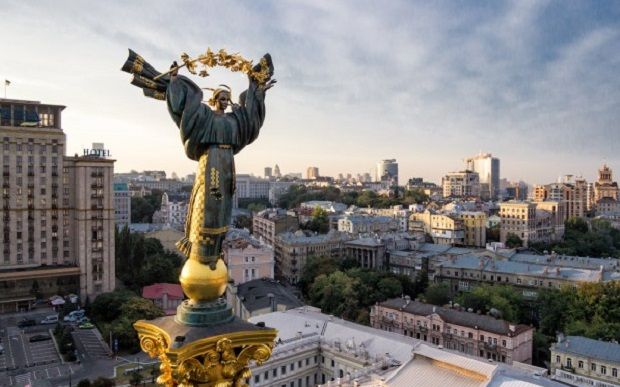
Ukraine on global stage in 2015: wins and fails
As in 2014, the annexation of Crimea and the Russian-ignited conflict in the east of Ukraine remained important issues on the international agenda in 2015. UNIAN recalled the main successes and failures of Ukraine’s foreign policy.
Ukraine insists on the implementation of the Minsk Agreement, and the Russian army and terrorist attacks increase attacks on the Ukrainian positions / news.bigmir.net
The past year has begun with events unpleasant to Ukraine – the need for new negotiations and the emergence of the next Minsk agreements. The Normandy format meeting in Minsk early February 2015 lasted nearly 16 hours, giving birth to the so-called "Minsk-2" agreements ("Minsk-1" were adopted in September 2014, later failing due to militants unwilling to implement its provisions).
According to these agreements, provided the cease-fire and withdrawal of heavy weapons, the two parties took a number of obligations that had to be fulfilled before Dec. 31, 2015. "For example, Minsk-2 provides for the all-for-all exchange of captives, restoration of Ukraine’s full control over its state border, withdrawal of all foreign armed groups, constitutional reform in Ukraine, and the elections in the occupied Donbass under the Ukrainian legislation and in accordance with OSCE standards," said Bohdan Yaremenko, a diplomat, former Consul General of Ukraine in Istanbul and Edinburgh, head of the Maidan of Foreign Affairs Foundation.
The diplomat stressed that part of provisions of the Minsk 2 agreements were a mistake for Ukraine, considering that they had been approved in a rush and not really thoughtfully. And these mistakes will haunt Ukraine in the future.
"The Minsk agreements give us no opportunity to break away from the state of war: we can neither win, nor lose, nor stop it,” says Yaremenko.
Political scientist, expert on international affairs Taras Chornovil, has a different view. According to him, unfortunately, Ukraine has failed to strengthen the role of the OSCE, to make it a real outside observer in Donbas, which would record all violations. But on the other hand, the very fact that the heads of states took personal part in the Minsk meeting, and Russia, in fact, was involved in the negotiation process by Ukraine’s Western partners, shows that the Kremlin has been considered by Europeans, not as a mediator between Kyiv and the militant leaders from the self-styled "DPR" and "LPR", but as an actor, a party to the conflict. Chornovil is convinced that this is particularly important, otherwise Ukraine would remain face to face with Russia in 2015 "that would clearly play not in our favor."
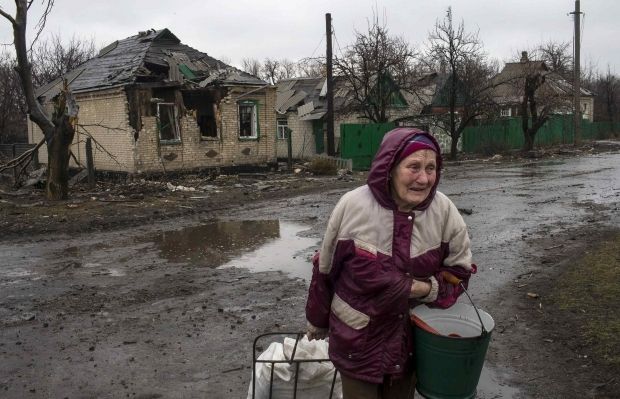
Now, at the end of the year, as Ukraine insists on the implementation of the Minsk 2, while the Russian-terrorist forces increase attacks on the Ukrainian positions, it’s interesting to see the reaction of the Russian side. For example, Russian Foreign Minister Sergei Lavrov said that President of Ukraine Petro Poroshenko "had every opportunity to push" the solutions that embody the Minsk-2, through the Ukrainian parliament. Instead, according to Lavrov, Poroshenko chose to be a "bully" and "gain some inner political points."
However, by prolonging sanctions against Russia, the Europeans could not be clearer in demonstrating their attitude to the implementation of the Minsk agreements by the parties to the conflict. On December 21, the European Union formally approved the corresponding decision, and on December 22, restrictive measures were extended until July 31, 2016. Thus, the West continued to fulfill its obligations taken in February, 2015, while Russia gave reason to the EU to reconsider positions, as it failed to fulfill any of the provisions of the Minsk 2/
Problematic Association
In addition to the extension of the anti-Russian sanctions, another good news for Ukraine was the ratification of the Ukraine-EU Association Agreement by all EU member states. "This is the best manifestation of the solidarity of Europe with Ukraine," said Poroshenko on November 20.
However, this joy is a bit overshadowed by the fact that, for the Association Agreement to take effect on January 1, 2016, it is required that all member states complete ratification procedure. However, the Netherlands intends to hold a consultative referendum on this issue, scheduled for April 6, 2016. As a result, according to the Minister of Foreign Affairs of the Netherlands Bert Koenders, until the referendum, the decision of the Government of the Netherlands on the Association is blocked.
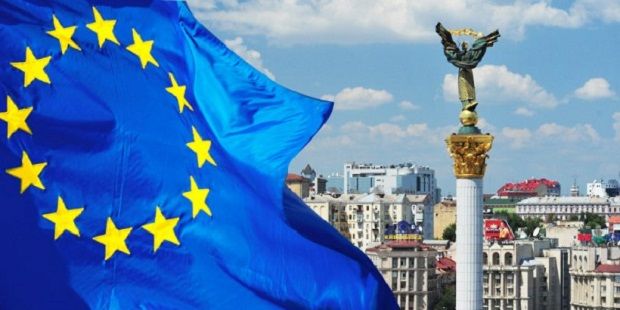
In addition, the Netherlands today is not happy about the actions of the Ukrainian authorities regarding the scandal with stolen Dutch paintings, which "popped up" in Ukraine, as one of the volunteer battalion leaders allegedly demanded a EUR 50 million ransom from the Dutch.
At the beginning of December 2015 person involved in the story with the missing paintings, the former first deputy commander of the volunteer battalion, Borys Humenyuk said the stolen paintings were in the occupied area of Donetsk region. Head of the National Police Khatia Dekanoidze stated that Ukrainian law enforcement agencies were ready to work with the Dutch colleagues to conduct an investigation into the incident. However, the lack of Ukraine’s prompt and adequate response to the Dutch claim jeopardizes the AA with the EU, according to the political scientist, Taras Chornovil.
At the same time, in his opinion, the story with the paintings and the referendum "looks like a single plan." Chornovil is positive that Ukraine should either conduct an immediate investigation into the circumstances of the incident, with immediate arrests conducted, or firmly refute all allegations. Since none of this was not followed, Russia took over the initiative on this information battle.
The new status at the UN Security Council
Howeverm, it is unlikely that the Netherlands can be perceived as part of the European club of "Putin’s friends," given that the country, along with Belgium, Australia and Ukraine supported the proposal on the need to set up an international tribunal to punish those responsible in the downing of MH17.
Despite the fact that Russia blocked a UN Security Council resolution in July 2015, using its veto, experts believe that the Kremlin will not escape the international criminal proceedings against the perpetrators of this crime.
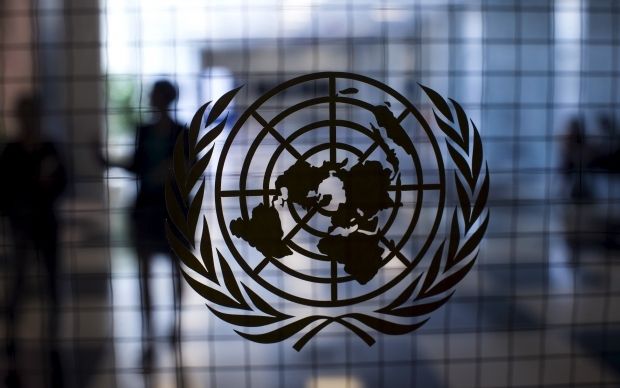
The Dutch Foreign Ministry said that five countries, advocating the establishment of the tribunal, were studying the alternative steps that could be taken to identify the perpetrators, including the lodging of claims with the international and national courts. In particular, it was noted that the UN court has the right to issue arrest arrest warrants, which will be valid in all countries. This means that a country that refuses to extradite suspects may be punished for non-compliance. In turn, the Ministry of Foreign Affairs of Australia said that the establishment of the court, which does not require the approval of the UN, is possible as part of the agreement between the states, whose citizens were killed in a plane crash.
It is noteworthy that Ukraine will continue negotiations on setting up an MH17 tribunal as a non-permanent member of the UN Security Council. On October 15, 2015 Ukraine gained such status for 2016-2017 with 177 votes. Experts insist that, although the election in Ukraine was evident, Russia was persistent up to the voting day in taking measures to prevent this from happening. In particular, it incited a number of other countries to put forward their candidacies as the non-permanent members of the Security Council.
However, according to the political scientist, director of the Ukrainian Barometer sociological service, Viktor Nebozhenko, there’s no real merit of Ukraine in this international success. According to him, this was the result of international agreements, and has been implemented in order to create opposition to Russia,as an aggressor state, at the UN.
The Free Trade Area as a geopolitical map
Another victory of Ukraine in the international arena may also be the introduction of the Deep and Comprehensive Free Trade Area (DCFTA) between Ukraine and the EU, which, despite the machinations on the part of Russia, will take effect from the January 1, 2016. "During the past year we have conducted 16 rounds of trilateral consultations between Ukraine, EU and Russia with respect to the implementation of the FTA with the EU. From these consultations, it became clear that there are no economic prerequisites for Russia to even raise the issue of the risks for the Russian economy," said Prime Minister of Ukraine Arseniy Yatsenyuk.
According to him, Russia's claims to the DCFTA have no economic justification. "Russia's task is to stop Ukraine from joining the EU economic space on January 1. And it has nothing to do with the economy. This is just big geopolitics," he said.
The Ukrainian prime minister’s words are confirmed by the fact that the countries of the Eurasian Economic Union - Kazakhstan, Belarus, Kyrgyzstan and Armenia – did not support Russia in its waiver of a free trade zone with Ukraine within the CIS framework.
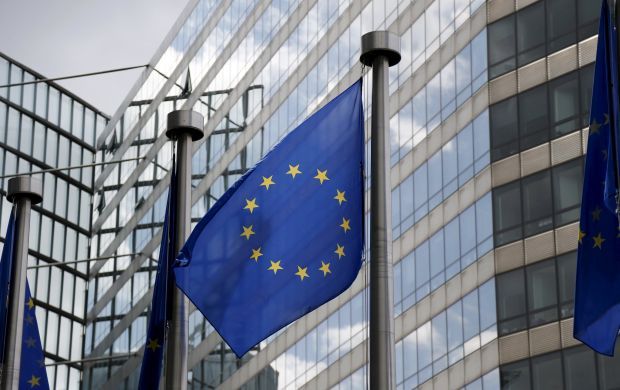
As for Russia, it intends to introduce new sanctions against Ukraine. "But Ukraine has prepared countersanctions, which will be introduced in response to both a trade embargo and the suspension of the agreement on free trade zone between Ukraine and Russia within the CIS,"said Yatsenyuk.
"FTA will be beneficial not so much for the Ukrainian producers, but for the Ukrainian consumers.” said Chornovil. “At least a real free market starts shaping up in our country, and the western manufacturers are coming, who will not tolerate corruption schemes. And this will discipline out officials, this is already changing the situation at the customs and allows building an actually competitive environment."
Opening Europe
Another important event in Ukraine’s foreign policy (but so far it’s only a conditional victory) was the positive report of the European Commission on visa liberalization with the European Union. On December 18, the European Commission (EC) has published the final report on the implementation by Ukraine of a Visa Liberalization Action Plan (VLAP).
Political analyst Taras Chornovil called the document a prepayment to Ukraine rather that an achievement of the Ukrainian diplomacy, as this report was adopted with vast reservations. "I don’t just see it as a visa-free package . When you get a report that you meet the conditions of a visa-free package, a number of problems in the relationship with the entire civilized world is gone," he admits.
In turn, Viktor Nebozhenko believes that the EC’s positive decision was reached not due to, but despite the actions of the Ukrainian diplomacy. "We were constantly late, we were constantly giving incomplete information, we did not fully comply with the EU requirements. This is not a success, as it is rather a necessary measure of European diplomacy and Ukraine’s luck. The structures of the EU had to pledge by the end of the year the liberalization of the visa regime, despite the fact that Ukraine is not ready for this. This is a kind of a prospect that Europe promises to Ukraine," he said.
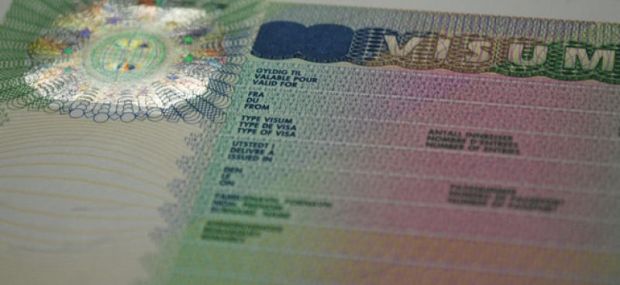
Anyway, according to President of Ukraine Petro Poroshenko, "the signing of the visa-free regime with the EU, the countries of the Schengen zone, opens new opportunities for us with the so-called Schengen "white list," which includes 57 countries." "This is an increase of the authority of and respect for the Ukrainian passport, the attractiveness of Ukrainian citizenship," he said.
In addition, according to the President, visa liberalization with the European Union facilitates Ukraine’s negotiations on visa liberalization with Australia, Canada and the United States.
U.S. support
The United States also showed strong support for Ukraine in the past year. It was so powerful that U.S. Vice President Joseph Biden came to Ukraine early December to somewhat pacify Ukrainian politicians too engaged in internal political battles. He became the second-ranking American politician (after U.S. President George W Bush, who visited Ukraine in 1991) to gave a speech in the Ukrainian parliament.
"Today, there was nothing in Biden’s speech that could provoke sharp rejection... I have not heard any words indicating fatigue. I heard the message that the U.S. is concerned about the situation in Ukraine - corruption reform, the war with Russia. But I have not seen signs of indifference," said the diplomat, former Deputy Prime Minister of Ukraine for European integration policy, MP from Batkivshchyna Party, Borys Tarasyuk.
Actually, when the leaders of the United States of this level come to Ukraine, they demonstrate that Ukraine is in the range of U.S. interests. "Had there been no such interests, there would be no visits," said Chornovil.
And America continues to openly state that it does not recognize the Russian annexation of Crimea and considers the peninsula an integral part of Ukrainian territory. And Washington continues to insist on Russia’s compliance with its obligations under the Minsk agreements.
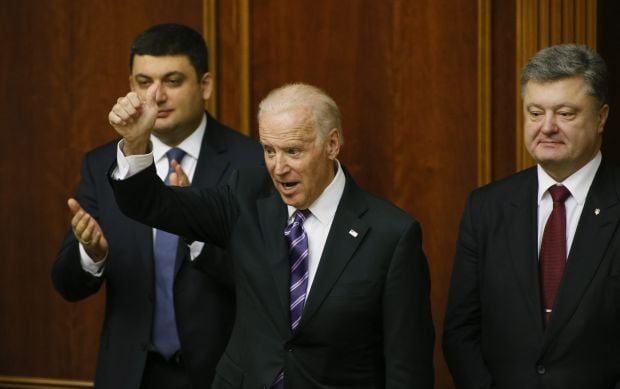
However, in addition to moral support, the U.S. is ready for a substantial financial aid. For example, in late December, U.S. President Barack Obama signed the Consolidated Law on budget allocations which provides a significant sum for Ukraine. "Together, the funds allocated for the State Department and the U.S. Department of Defense, and can be used on programs of military assistance to Ukraine and security may exceed the amount of $300 million," says the report of the Ukrainian Embassy to the United States.
In particular, these provisions include the $250 million allocated for Ukraine through the U.S. Defense Department. The funds may be directed for military exercises, provision of military equipment, defensive lethal weapons, logistic support, supplies and services, intelligence support for Ukraine’s armed forces and national security agencies.
However, despite some progress for Ukraine in the international arena in 2015, some real failures and generous steps of our partners, Kyiv will need to engage seriously in fixing its errors, keeping its promises and implementing reforms, lomg awaited by the Ukrainians and the West. Otherwise, the financial aid from the U.S., the visa-free regime, and a new status at the United Nations will all remain just untaken chances.
Tatiana Urbanskaya, Kostyantyn Honcharov

